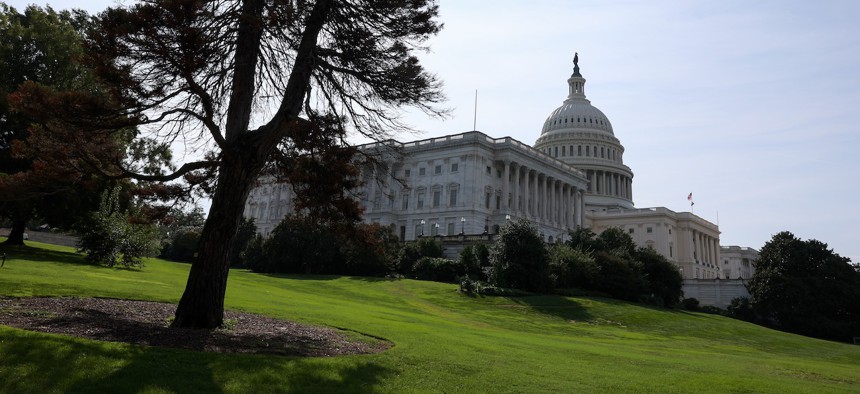
Twenty days into the government shutdown, Senate Democrats were expected to reject for the 11th time a short-term spending measure to fund agencies through Nov. 21. Anna Moneymaker/Getty Images
Senate to vote on immediately paying feds working during shutdown as funding deal remains elusive
Democrats appear to oppose the idea, while Republicans suggest a long-term stopgap bill is possible if government does not reopen soon.
As the Senate continues to take failed votes to reopen the government, the chamber will soon shift to a new approach that would ensure on-time paychecks for feds working during the shutdown.
In its 20th day, Senate Democrats were expected to reject for the 11th time a short-term spending measure to fund agencies through Nov. 21. Senate Republicans are looking to ramp up pressure on Democrats by allowing normal paychecks for employees required to continue reporting to their jobs without immediate compensation during the shutdown.
Senate Majority Leader John Thune, R-S.D., told reporters he would on Monday evening take the first procedural step to bring the measure up for consideration, with a vote taking place either Wednesday or Thursday.
“They're all going to get paid eventually, but I think people who are working right now and not getting paid ought to be,” Thune said.
Sen. Ron Johnson, R-Wis., introduced a bill earlier this month that would immediately pay all “excepted” employees as defined by the Office of Personnel Management. That refers to all federal staff working during the shutdown because their jobs are deemed necessary to protect life or property. Those employees are already guaranteed back pay, but are not paid on time during the funding lapse. They have so far missed a few days of pay from their most recent paycheck and are slated to miss an entire paycheck next week. Excepted workers have detailed to Government Executive that they are relying on food banks, coworker carpools and side jobs to stay afloat without their normal pay. Johnson’s bill would be retroactive to when the shutdown began on Oct. 1.
Johnson said his measure was non-partisan and should be supported to "do something that makes sense around here for once."
"We've already gotten law where we provide back pay, so why not pay them on time?" Johnson said. "Don't make people drive DoorDash to pay their daughter's tuition."
Nearly 700,000 federal employees are currently home on furlough, all of whom received only partial paychecks in recent days since the last few days of the pay period occurred after the shutdown began. Another roughly 1.5 million are working, a portion of whom are getting normal paychecks as their agencies are using leftover or otherwise available funds. The majority, however, are working without on-time pay.
Providing normal pay to those employees removes one of the central pain points of the shutdown and could make it easier for lawmakers to hold out before agreeing to a deal to reopen government. In 2019, a rise in absenteeism from controllers and Transportation Security Administration staff toward the end of the record-setting 35-day shutdown—many of whom said they could no longer afford to work without paychecks—helped spur Congress to enact funding and reopen government.
Senate Democrats on Monday told Government Executive they were still reviewing the details of the bill, but largely threw cold water on the proposal. The suggested it would give President Trump too much leeway to decide who gets paid, as agencies maintain significant latitude in determining who is excepted.
"It's just further abdication of Congress's role and giving it to the president to decide who he favors and who he doesn't," said Sen. Tina Smith, D-Minn.
Sen. Tim Kaine, D-Va., who represents one of the largest contingents of federal workers, said if the measure contained certain guarantees about who would get paid he would be open to it.
"I worry that it basically is a bill that just lets the president decide who he wants to pay and who he doesn't want to pay," Kaine said.
Sen. Angus King, I-Maine., who caucuses with Democrats, said the measure appeared to "pick winners and losers" and he was not sure he could support that.
House Speaker Mike Johnson, R-La., has also not committed to bringing the immediate-pay bill up for a vote in his chamber even if it did pass the House. Minority Leader Hakeem Jeffries, D-N.Y., agreed with his Senate colleagues that the measure would give Trump too much power.
“It appears to be more like a political ploy giving Donald Trump discretion over which employees should be compensated and which employees should not be compensated," Jeffries said. "All employees should be compensated, and that will happen when we reopen the government.”
Trump previously announced he would unilaterally shift funds around within the Defense Department to ensure military members are paid on time.
Thune also said it was probably time for House Republicans to return to the Capitol to vote on a longer-term spending bill. When the House was last in session on Sept. 19, it passed what was then intended to be a seven-week stopgap continuing resolution. Thune acknowledged that even if the Senate were able to move the House-backed CR to President Trump’s desk, lawmakers may not have enough time to negotiate and enact full-year appropriations. That has created the risk of a “long-term CR,” he said.
“I just don't think that's the way that we ought to be funding the government around here,” Thune said, “but every day that passes, it becomes more possible as an eventuality.”
Share your news tips with us: Eric Katz: ekatz@govexec.com, Signal: erickatz.28
NEXT STORY: House Democrats want answers on CISA reassignments to border security, immigration roles







